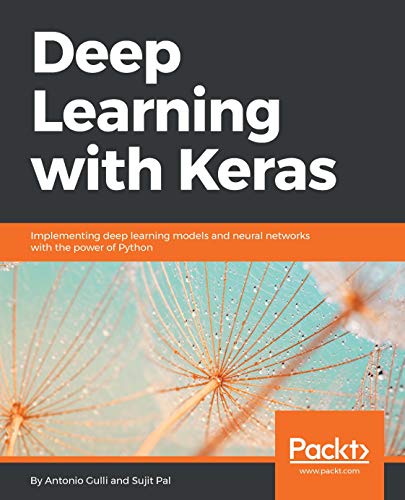Key Features
Implement various deep-learning algorithms in Keras and see how deep-learning can be used in games
See how various deep-learning models and practical use-cases can be implemented using Keras
A practical, hands-on guide with real-world examples to give you a strong foundation in Keras
Book Description This book starts by introducing you to supervised learning algorithms such as simple linear regression, the classical multilayer perceptron and more sophisticated deep convolutional networks. You will also explore image processing with recognition of hand written digit images, classification of images into different categories, and advanced objects recognition with related image annotations. An example of identification of salient points for face detection is also provided. Next you will be introduced to Recurrent Networks, which are optimized for processing sequence data such as text, audio or time series. Following that, you will learn about unsupervised learning algorithms such as Autoencoders and the very popular Generative Adversarial Networks (GAN). You will also explore non-traditional uses of neural networks as Style Transfer.
Finally, you will look at Reinforcement Learning and its application to AI game playing, another popular direction of research and application of neural networks.
What you will learn
Optimize step-by-step functions on a large neural network using the Backpropagation Algorithm
Fine-tune a neural network to improve the quality of results
Use deep learning for image and audio processing
Use Recursive Neural Tensor Networks (RNTNs) to outperform standard word embedding in special cases
Identify problems for which Recurrent Neural Network (RNN) solutions are suitable
Explore the process required to implement Autoencoders
Evolve a deep neural network using reinforcement learning
About the Author
Antonio Gulli is a software executive and business leader with a passion for establishing and managing global technological talent, innovation, and execution. He is an expert in search engines, online services, machine learning, information retrieval, analytics, and cloud computing. So far, he has been lucky enough to gain professional experience in four different countries in Europe and managed people in six different countries in Europe and America. Antonio served as CEO, GM, CTO, VP, director, and site lead in multiple fields spanning from publishing (Elsevier) to consumer internet (Ask.com and Tiscali) and high-tech R&D (Microsoft and Google).
Sujit Pal is a technology research director at Elsevier Labs, working on building intelligent systems around research content and metadata. His primary interests are information retrieval, ontologies, natural language processing, machine learning, and distributed processing. He is currently working on image classification and similarity using deep learning models. Prior to this, he worked in the consumer healthcare industry, where he helped build ontology-backed semantic search, contextual advertising, and EMR data processing platforms. He writes about technology on his blog at Salmon Run.
Table of Contents
Neural Networks Foundations
Keras Installation and API
Deep Learning with ConvNets
Generative Adversarial Networks and WaveNet
Word Embeddings
Recurrent Neural Network — RNN
Additional Deep Learning Models
AI Game Playing
Conc


























دیدگاه کاربران